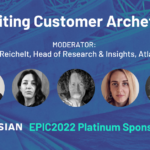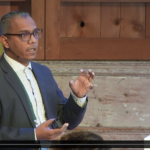
An EPIC2022 Platinum Sponsor Panel by Atlassian
Moderator: LEISA REICHELT (Atlassian)
Panelists: SARAH HYNE (Atlassian), (Atlassian), GILLIAN BOWAN (Atlassian), ANDRé JANSSON (Atlassian)
[s2If current_user_can(access_s2member_level1)]
[/s2If]
[s2If !is_user_logged_in()]
Please sign in or become an EPIC Member to access video.
→ Learn about Membership
→ Browse Video Library
[/s2If]
[s2If current_user_is(subscriber)]
Join EPIC to access video:
→ Learn about Membership
→ Browse Video Library
[/s2If]
In this panel, moderated by Head of Research & Service Experience, Leisa Reichelt, Atlassian researchers and data scientists will explore how different crafts, methodologies, and perspectives came together to evolve one of our most important customer archetypes; the champion.
Showcasing the power of a research community, panelists will reflect on how they contributed to the evolution of this critical archetype by employing a range of research methods and cross-craft explorations.
Join...




